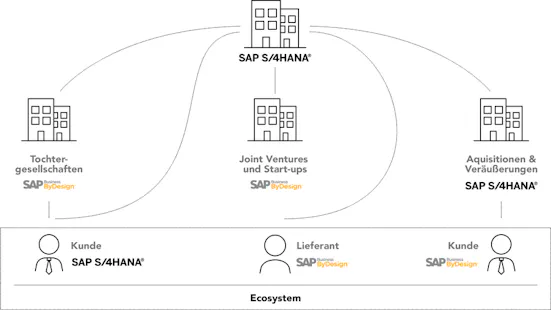
Simply connect subsidiaries
through an ERP in the cloud
The company as a whole benefits from improved planning and control, standardized processes and better cooperation. At the same time, the local company retains sufficient independence and flexibility. Implementation is very quick and no in-house IT resources are required. And the monthly rental price is based on the number of users and therefore the size of the subsidiary.
"Smaller subsidiaries often don't need the functional depth of the systems of corporate headquarters."
Challenges in the company
- The company is growing faster than the speed at which the system landscape can be adapted.
- The administrative effort for the ERP system in the company is becoming increasingly expensive and time-consuming.
- Subsidiaries are to be integrated into the existing SAP landscape.
- There is a lack of infrastructure, resources and time for the implementation and integration of ERP software.
Typical use cases
Local sales organization
Sales and logistics organization
Local customer service
Shared service unit
Services, consulting, engineering
Why a 2-tier strategy?
What does 2-tier strategy with cloud ERP actually mean?
What are the advantages of a 2-TIER STRATEGY INTEGRATION?
Advantages for the company headquarters
- Standardized database for improved strategic planning and control
- Standardized and uniform processes
- Increased cost control
- Better collaboration throughout the company

Advantages for the subsidiary
- Adaptability to corporate requirements and business processes
- Greater global reach while meeting local requirements
- Ability to adopt best practices
- Reduction of complexity resulting from ERP usage
- Fast and cost-effective implementation
- No local IT infrastructure required
- Fixed monthly rental price
- User-based costs
- Mobile use - always and everywhere
YOU MIGHT ALSO BE INTERESTED IN
Connection in record time
WHAT DOES CLOUD ERP FROM SAP COST?
CHANGE FROM R3 OR ECC
BECOMING AN INTELLIGENT COMPANY WITH CLOUD ERP
CLOUD ERP STUDY
Free ERP CHECK
Connect a subsidiary?
Our Cloud ERP expert Dirk Haeder will be happy to help you.

About All for One
All for One is the number one SAP partner in the German-speaking SME market with more than 3,500 customers in Germany, Austria, and Switzerland.
Our experts go to work every day with great commitment, passion and know-how, making All for One a strategic partner for SAP, IT and business.







